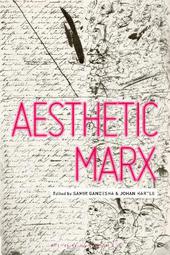
|
Aesthetic Marx
Paperback / softback
Main Details
| Title |
Aesthetic Marx
|
| Authors and Contributors |
Edited by Samir Gandesha
|
|
Edited by Johan F. Hartle
|
| Physical Properties |
| Format:Paperback / softback | | Pages:344 | | Dimensions(mm): Height 234,Width 156 |
|
| Category/Genre | Theory of art
Philosophy - aesthetics
Social and political philosophy |
|---|
| ISBN/Barcode |
9781350074712
|
| Classifications | Dewey:335.4092 |
|---|
| Audience | | Tertiary Education (US: College) | |
|---|
| Illustrations |
35 b&w
|
|
Publishing Details |
| Publisher |
Bloomsbury Publishing PLC
|
| Imprint |
Bloomsbury Academic
|
| Publication Date |
3 May 2018 |
| Publication Country |
United Kingdom
|
Description
The whole of Marx's project confronts the narrow concerns of political philosophy by embedding it in social philosophy and a certain understanding of the aesthetic. From those of aesthetic production to the "poetry of the future" (as Marx writes in the Eighteenth Brumaire), from the radical modernism of bourgeois development to the very idea of association (which defined one of the main lines of tradition in the history of aesthetics), steady references to Dante, Shakespeare and Goethe, and the idea that bourgeois politics is nothing but a theatrical stage: the aesthetic has a prominent place in the constellation of Marx's thought. This book offers an original and challenging study of both Marx in the aesthetic, and the aesthetic in Marx. It differs from previous discussions of Marxist aesthetic theory as it understands the works of Marx themselves as contributions to thinking the aesthetic. This is an engagement with Marx's aesthetic that takes into account Marx's broader sense of the aesthetic, as identified by Eagleton and Buck-Morss - as a question of sense perception and the body. It explores this through questions of style and substance in Marx and extends it into contemporary questions of how this legacy can be perceived or directed analytically in the present. By situating Marx in contemporary art debates this volume speaks directly to lively interest today in the function of the aesthetic in accounts of emancipatory politics and is essential reading for researchers and academics across the fields of political philosophy, art theory, and Marxist scholarship.
Author Biography
Samir Gandesha is Director at the Institute for the Humanities, Simon Fraser University, Canada. Johan Hartle is an Assistant Professor of Philosophy of Art and Culture at the University of Amsterdam, the Netherlands and Adjunct Professor for Aesthetics at the China Academy of Art, Hangzhou, China. He was visiting research fellow at Franz Rosenzweig Minerva Research Centre for German Jewish Studies at Hebrew University, Jerusalem and Humboldt Research Fellow at the Universita Roma Tre. He is editor, along with Samir Gandesha, of Reification and Spectacle. The Timeliness of Western Marxism (2016).
ReviewsThis volume offers many promising lines of inquiry whose practical and theoretical elaborations represent an exciting possibility for future research. * Marx and Philosophy Review of Books * The crisis of neoliberal capitalism has occasioned an urgent and widespread reassessment of Marx and his significance. Anyone seeking to take its pulse in the discourses of the aesthetic must read Aesthetic Marx. -- Stewart Martin, Editor of 'Radical Philosophy' and Reader in Philosophy and Fine Art, Middlesex University, UK Gandesha and Hartle's vividly choreographed collection of essays succeeds in giving a new sense to Marx. It shows how the familiar scenes of dialectic, class consciousness and self-consciousness play out on a wider stage of passion, affect and sensibility. This invitation to revisit the texts of Marx and be astonished anew by their beauty and complexity is not to be missed. -- Howard Caygill, Professor at the Centre for Research in Modern European Philosophy, Kingston University, London, UK A vibrant and inspired collection of essays, Aesthetic Marx prompts us to re-imagine the work of Marx as well as our long-standing understanding of aesthetics. Gandesha and Hartle's expansive introduction offers an invaluable and detailed overview of the fundamentally aesthetic character of Marx's thought, arguing in the process for a new vision of the operations of Marx's emancipatory critique. Essential reading for artists, critics and theorists who want to better understand why Marx's ideas remain at the heart of our political and aesthetic imaginaries in the twenty-first century. -- Imre Szeman, Professor of Communication, Performance and Design, University of Waterloo, Canada
|